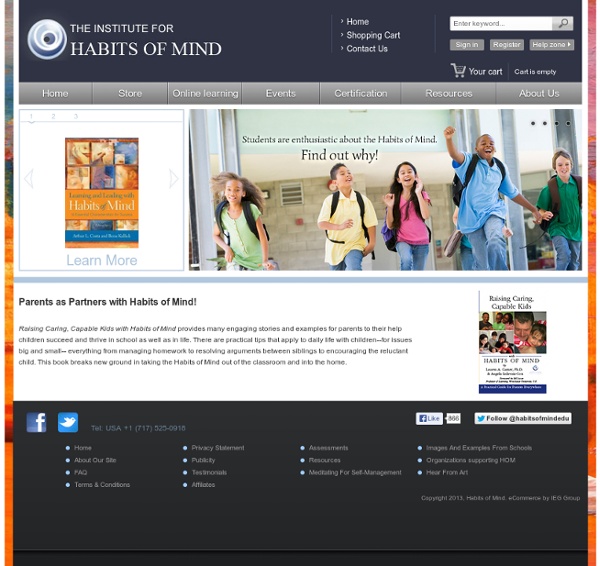



http://www.habitsofmindinternational.com/store/home.php
Positive Psychology Exercise - Emoclear Self-Helpapedia Emoclear Positve Psychology Exercise I: Doing Pleasurable, Important, and Meaningful Activities Every day for two weeks do the following: 1. Choose a pleasurable activity to do alone and do it to completion. Example: Gardening or writing.2. Choose a pleasurable activity to do with others and do it until completion. Learning Styles - Learning skills from MindTools.com Understanding Learning Preferences Identifying your preferred style of learning can make gaining new knowledge and skills easier. Have you ever tried to learn something fairly simple, yet failed to grasp the key ideas? Or tried to teach people and found that some were overwhelmed or confused by something quite basic? Candy Bar Game for Your Family Reunion Aunt Lynn has shared fun matching games at our family reunions and parties for years. She has adapted the game to fit many different reunion themes, baby showers, wedding showers and family history events. Write the name of each candy bar you will be using on one 5X7 card and the description on another. If possible hang the cards on a wall with a piece of masking tape. If you are camping just lay the cards on a picnic table or on a tarp on the ground.
Frequently Requested Resources The resources below are some of our most frequently requested and are provided for you here for easy access. This article is written by Art Costa and describes the 16 Habits of Mind. It is an excellent starting place for your work with HOM. Click on the image to download. MindMapping: Mind Maps, PDF Management and Reference Management Are you using mind mapping tools such as MindManager, FreeMind or XMind? And reference management tools such as JabRef, Endnote, or Zotero? And do you sometimes even create bookmark in PDFs?
Gardner's Multiple Intelligences Howard Gardner of Harvard has identified seven distinct intelligences. This theory has emerged from recent cognitive research and "documents the extent to which students possess different kinds of minds and therefore learn, remember, perform, and understand in different ways," according to Gardner (1991). According to this theory, "we are all able to know the world through language, logical-mathematical analysis, spatial representation, musical thinking, the use of the body to solve problems or to make things, an understanding of other individuals, and an understanding of ourselves. Where individuals differ is in the strength of these intelligences - the so-called profile of intelligences -and in the ways in which such intelligences are invoked and combined to carry out different tasks, solve diverse problems, and progress in various domains."
brainstorm techniques, brain storming - how to run brainstorming sessions, brainstorming activities, ideas and meetings home » teambuilding/games » brainstorming process brainstorming technique for problem-solving, team-building and creative process Brainstorming with a group of people is a powerful technique. Brainstorming creates new ideas, solves problems, motivates and develops teams. Brainstorming motivates because it involves members of a team in bigger management issues, and it gets a team working together. However, brainstorming is not simply a random activity.
Habits Of Mind Step 1 – Valuing Habits of Mind for yourself: For the Habits of Mind to have meaning for students they have to have meaning for teachers. Exploring and unpacking what is meant by each of the sixteen habits means to you and your colleagues is a great place to begin. Once teachers see the value of the Habits, it is easier and more authentic to help our students see their value. 25 Acts of Body Language to Avoid Our body language exhibits far more information about how we feel than it is possible to articulate verbally. All of the physical gestures we make are subconsciously interpreted by others. This can work for or against us depending on the kind of body language we use. Some gestures project a very positive message, while others do nothing but set a negative tone.